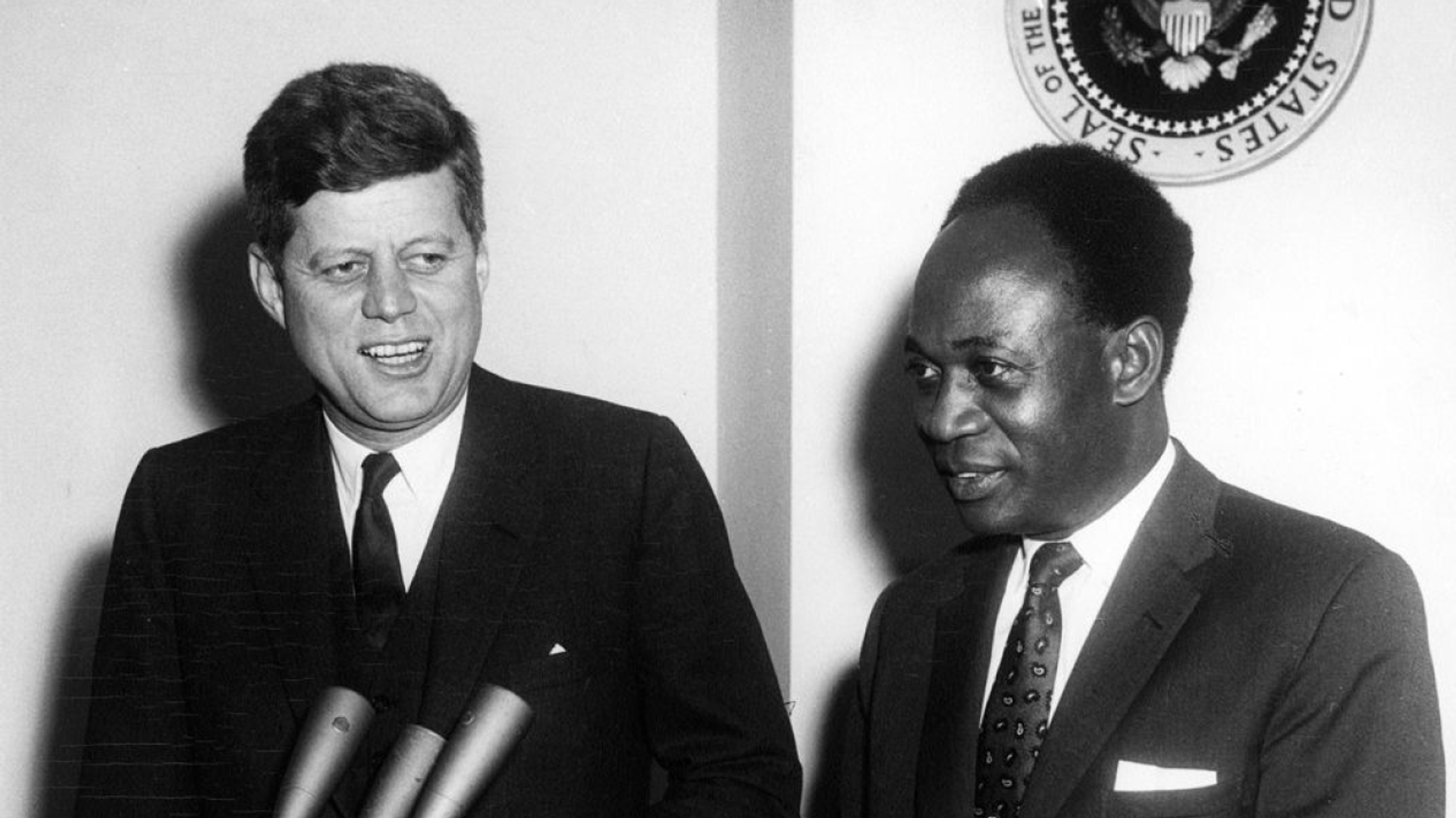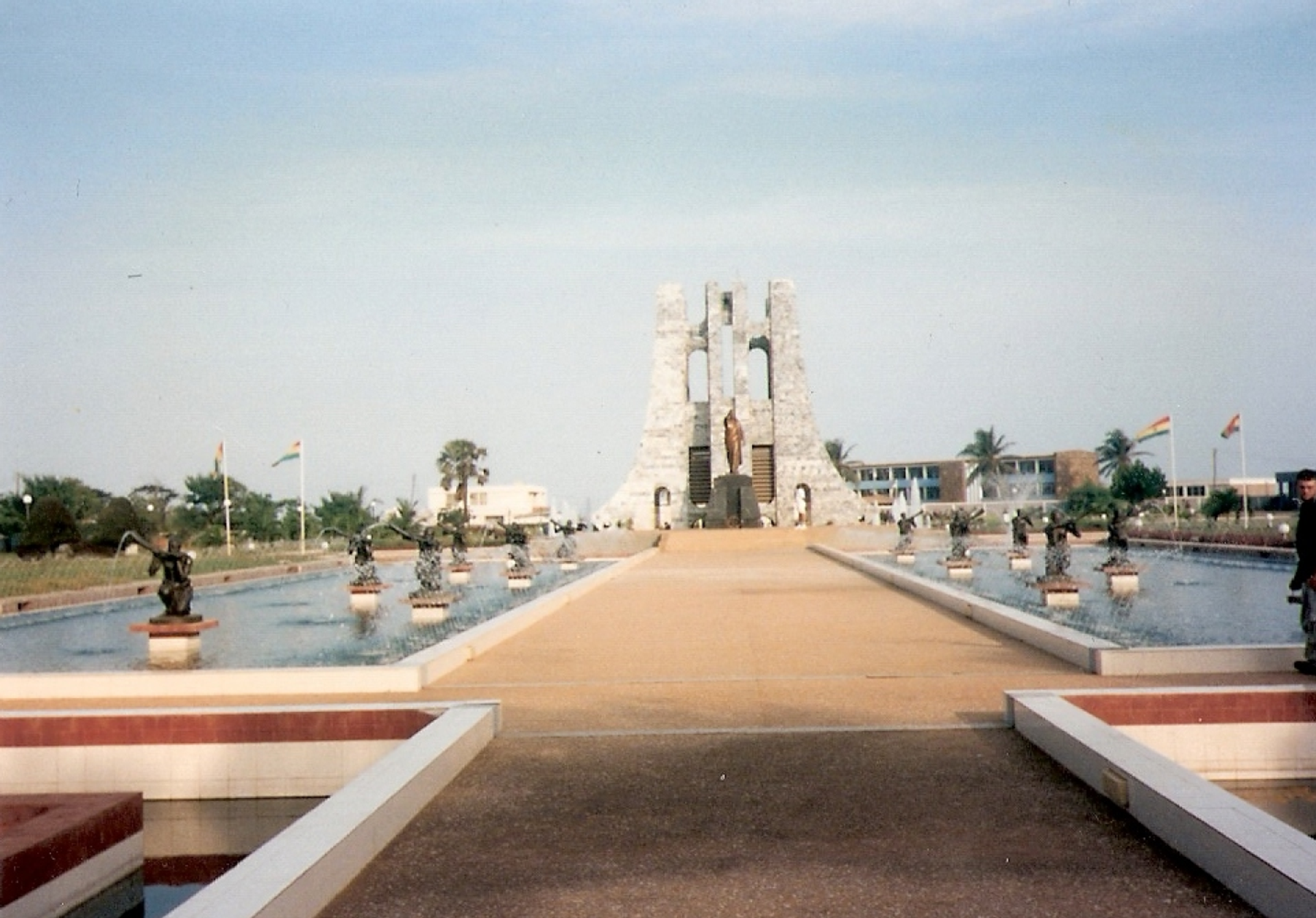https://sputnikglobe.com/20220428/ghanas-convention-peoples-party-seeks-proper-funeral-for-liberation-leader-kwame-nkrumah-1095129398.html
Ghana's Convention People's Party Seeks Proper Funeral for Liberation Leader Kwame Nkrumah
Ghana's Convention People's Party Seeks Proper Funeral for Liberation Leader Kwame Nkrumah
Sputnik International
Kwame Nkrumah played a key role in rallying what was then the British colony of the Gold Coast to demand independence from London, which it achieved with him... 28.04.2022, Sputnik International
2022-04-28T18:02+0000
2022-04-28T18:02+0000
2022-11-24T11:01+0000
burial
pan-africanism
kwame nkrumah
coup
ghana
https://cdn1.img.sputnikglobe.com/img/07e6/04/1c/1095129343_0:185:1266:897_1920x0_80_0_0_294f9254b168d23b83871827b14d34b1.png
On the 50th anniversary of his death, Kwame Nkrumah’s political party has promised to give the pan-African leader a proper burial.Speaking to the press during a visit to Nkrumah’s mausoleum in Accra on Wednesday, the 50th anniversary of his death, Convention People’s Party (CPP) General Secretary Nana Yaa Jantuah said the leader’s “restless” soul was crying out for rest.“It is on this premise that the Convention People’s Party and like-minded people in the diaspora and African countries would organize a befitting funeral for Osagyefo Dr. Kwame Nkrumah, the first President of the Republic of Ghana and the doyen of Pan-Africanism movement in the world,” Jantuah added. The funeral would take place in November 2022.The mausoleum which houses the remains of Kwame Nkrumah and his wife, Fathia, was built in 1992. The premises also host a museum with artefacts from his life, but the CPP has been seeking the return of items taken from Nkrumah during his 1966 overthrow, according to the Ghanian Times.The RedeemerNkrumah was born in 1909 in Nkroful, a village in southwestern Ghana, then known as the Gold Coast. As a young man, he travelled to the US and later to the UK for an extensive education before returning to Africa and organising against European colonial rule. While some revolutionaries advocated a piecemeal approach, Nkrumah was part of a growing cadre of anti-colonial leaders who favoured pan-Africanism and socialism.He formed the CPP in 1949 to struggle for independence in the Gold Coast, which was achieved in 1957, two years after he won election from a prison cell. The new country was an assemblage of the Gold Coast, Ashanti Kingdom, Northern Territories and British Togoland. Under his leadership, Ghana pursued a socialist planned economic development model and supported other anti-colonial movements across Africa, Algeria’s war for independence from France.By the admission of officials in the US Central Intelligence Agency (CIA) at the time, the coup plotters seized power in Accra in 1966 in close coordination with Washington, which regarded him as the largest obstacle to US foreign policy in Africa. Nkrumah was on a visit to China at the time.He spent the rest of his life in exile in Conakry, Guinea, where he lived as a guest of President Ahmed Sékou Touré, who made him honorary co-president. Nkrumah contracted prostate cancer and flew to the Socialist Republic of Romania for treatment, where he died in Bucharest on April 27, 1972. He was given a state funeral in Conakry, but his remains were later interred in a tomb in his home village in Ghana until being moved to the mausoleum in 1992.
ghana
Sputnik International
feedback@sputniknews.com
+74956456601
MIA „Rossiya Segodnya“
2022
Sputnik International
feedback@sputniknews.com
+74956456601
MIA „Rossiya Segodnya“
News
en_EN
Sputnik International
feedback@sputniknews.com
+74956456601
MIA „Rossiya Segodnya“
Sputnik International
feedback@sputniknews.com
+74956456601
MIA „Rossiya Segodnya“
burial, pan-africanism, kwame nkrumah, coup, ghana
burial, pan-africanism, kwame nkrumah, coup, ghana
Ghana's Convention People's Party Seeks Proper Funeral for Liberation Leader Kwame Nkrumah
18:02 GMT 28.04.2022 (Updated: 11:01 GMT 24.11.2022) Kwame Nkrumah played a key role in rallying what was then the British colony of the Gold Coast to demand independence from London, which it achieved with him at the helm in 1957. Nine years later he was overthrown, and spent the rest of his life in nearby Guinea Conakry, where he was buried in 1972.
On the 50th anniversary of his death, Kwame Nkrumah’s political party has promised to give the pan-African leader a proper burial.
Speaking to the press during a visit to Nkrumah’s mausoleum in Accra on Wednesday, the 50th anniversary of his death, Convention People’s Party (CPP) General Secretary Nana Yaa Jantuah said the leader’s “restless” soul was crying out for rest.
“Perhaps, his wonder was, ‘am I going to get a befitting burial when the Lord calls me,’” she said, according to local news outlet Joy News. “A befitting burial he did not get, a restless soul which needs to rest is the bane of Osagyefo Dr. Kwame Nkrumah,” she added, referring to him using the honorific that means “redeemer” in his native Akan language.
“It is on this premise that the Convention People’s Party and like-minded people in the diaspora and African countries would organize a befitting funeral for Osagyefo Dr. Kwame Nkrumah, the first President of the Republic of Ghana and the doyen of Pan-Africanism movement in the world,” Jantuah added. The funeral would take place in November 2022.
The mausoleum which houses the remains of Kwame Nkrumah and his wife, Fathia, was built in 1992. The premises also host a museum with artefacts from his life, but the CPP has been seeking the return of items taken from Nkrumah during his 1966 overthrow, according to the
Ghanian Times.
Nkrumah was born in 1909 in Nkroful, a village in southwestern Ghana, then known as the Gold Coast. As a young man, he travelled to the US and later to the UK for an extensive education before returning to Africa and organising against European colonial rule. While some revolutionaries advocated a piecemeal approach, Nkrumah was part of a growing cadre of anti-colonial leaders who favoured pan-Africanism and socialism.
He formed the CPP in 1949 to struggle for independence in the Gold Coast, which was achieved in 1957, two years after he won election from a prison cell. The new country was an assemblage of the Gold Coast, Ashanti Kingdom, Northern Territories and British Togoland. Under his leadership, Ghana pursued a socialist planned economic development model and supported other anti-colonial movements across Africa,
Algeria’s war for independence from France.
Nkrumah also contributed to the pan-African cause theoretically, penning treatises on the necessity of African unity and seeking African solutions for African problems, which would inspire future generations of revolutionaries like Walter Rodney and Thomas Sankara. His book “Neocolonialism: The Last Stage of Imperialism,” described in detail how European companies retained de facto control over African affairs through ownership of national resources, despite the colonies having achieved formal political independence.
By the admission of officials in the US Central Intelligence Agency (CIA) at the time, the coup plotters seized power in Accra in 1966 in close coordination with Washington, which regarded him as the
largest obstacle to US foreign policy in Africa. Nkrumah was on a visit to China at the time.
He spent the rest of his life in exile in Conakry, Guinea, where he lived as a guest of President Ahmed Sékou Touré, who made him honorary co-president. Nkrumah contracted prostate cancer and flew to the Socialist Republic of Romania for treatment, where he died in Bucharest on April 27, 1972. He was given a state funeral in Conakry, but his remains were
later interred in a tomb in his home village in Ghana until being moved to the mausoleum in 1992.


